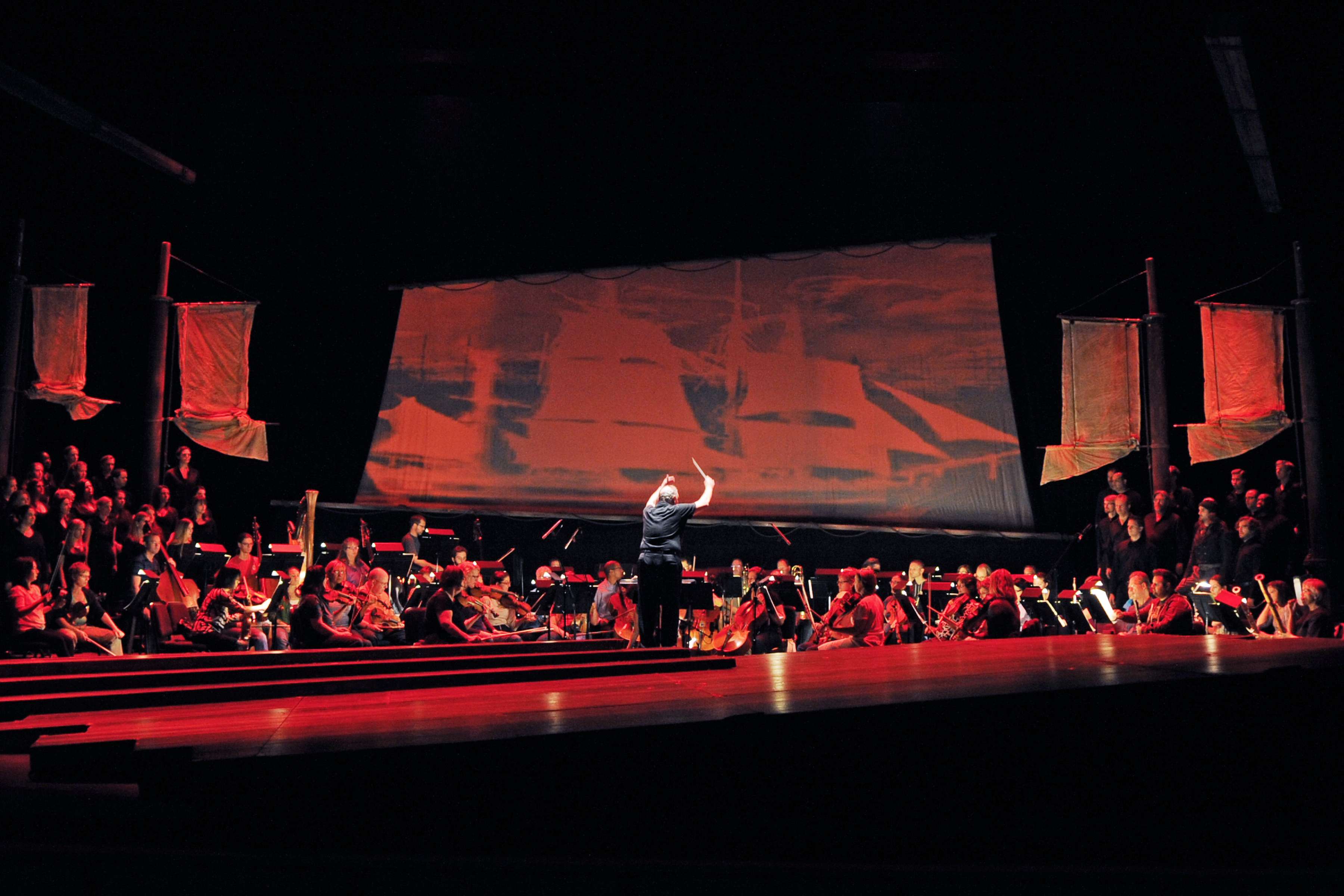|
Back
This Dutchman Flies Phoenix
Symphony Hall
11/15/2013 - & November 16, 17 (Phoenix), 23, 24 (Tucson), 2013
Richard Wagner: Der fliegende Holländer
Marc Delavan (Dutchman), Lori Phillips (Senta), Raymond Aceto (Daland), Corey Bix (Erik), Christian Reyer (Steuermann), Beth Lytwynec (Mary)
The Arizona Opera and Chorus, Henri Venanzi (Chorus Master), Joseph Rescigno (Conductor)
Bernard Uzan (Director), Peter Dean Beck (Scenic Designer), Douglas Provost (Lighting/Projection Designer), A.T. Jones & Sons, Baltimore (Costumes)

(© Tim Trumble)
Arizona Opera celebrates the bicentenary of Wagner's birth with a semi-staged production of The Flying Dutchman, with the orchestra on stage, chorus in standard concert attire, principals in period costumes evolving on a downstage platform with an appropriate level of scaled-down gesture and theatricality. In these financially straitened times, semi-staged productions are not uncommon. They can be visually attractive, though, if supported by an inventive concept. Was it the case last night? Well, some. Director Bernard Uzan uses dramatic projections, some of which from French prolific illustrator and engraver Gustave Doré (1832-1883), specifically, his illustrations of Coleridge's poem The Rime of the Ancient Mariner (pub. 1798). If the connection between the mariner and the Dutchman - both doomed to wander aimlessly telling their sad tale - is pertinent, the slideshow, however, soon becomes tedious and the Gothic atmosphere conveyed by the images loses impetus. Further, staging such a beautiful overture with Senta as a child, Senta as an adolescent, and Senta as a mature woman is highly distracting and unnecessary. All the more so as we rapidly find ourselves engulfed in the musical quality of the performance.
The Flying Dutchman has always been a conductor's opera. With Joseph Rescigno at the helm of Arizona Opera Orchestra, we are treated with intense and assured conducting. From the very first bars of the overture, he imposes a lightning tension and never releases his grip. The pace and drive are everything they should be, and so is the balance between German heaviness and Romanticism. The reading of the score is spacious in its tempos, never bombastic, but delicately subtle and stormy when needed. The musicians' response? Passionate and cohesive, with shimmering strings and riotous brass. Likewise, the strong vocal cast assembled by Arizona Opera makes for a commendable performance.
Dramatic soprano Lori Phillips made her Met début with Senta in 2010. Vocally, she rides the orchestra with no hint of strain, and tones it all down, with lyrical and well-controlled pianissimos when required. As an experienced Wagnerian, she brings commanding presence and the most persuasive sense of line in her "Ballad." Phillips creditably portrays the impassioned fulfillment of the young woman's dream and the shedding of her useless existence. Her Senta is introspective, neurotic, and powerful without sacrificing femininity.
World acclaimed baritone Marc Delavan has the heft of his part. He is a charismatic Dutchman, clear and noble of tone, intriguing, gloomy, and sympathy-inspiring. With his wide range of expression, he fully captures the tortured nature of his character, turning his Act I "Die Frist ist um..." into a prayer, as well as a protest. While coping with a strenuous music, Raymond Aceto is a ringing and vocally secure Daland, though clearly struggling with German pronunciation. Aceto crosses the line of good taste when introducing Senta to the Dutchman in Act II. At such a climactic moment, playing his character with a slight Rossini-buffo edge draws laughter from the audience and is arguable, to the say the least. Corey Bix is an ardent, idiomatic Erik. Christian Reyer as the Steuermann displays a robust voice and his delivery of "Mit Gewitter und Sturm aus fernem Meer..." is adequate. Beth Lytwynec does justice to the small part of Mary, both vocally and dramatically.
The chorus is admirable throughout. From the "Ho-jo-he! Hal-lo-jo" in Act I, to the women's spinning chorus "Summ und brumm..." in Act II, to the sailors' "Steuermann, lass' die Wacht..." in Act III, they produce waves after waves of gorgeous sound.
Christian Dalzon
|